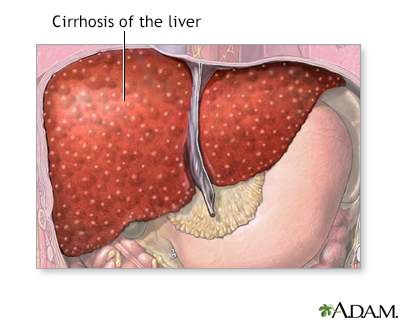Liver cirrhosis; Chronic liver disease; End-stage liver disease; Liver failure - cirrhosis; Ascites - cirrhosis DefinitionCirrhosis is scarring of the liver and poor liver function. It is the last stage of chronic liver disease. CausesCirrhosis is most often the end result of chronic liver damage caused by long-term (chronic) liver disease. Common causes of chronic liver disease in the United States are:
Less common causes of cirrhosis include:
SymptomsThere may be no symptoms, or symptoms may come on slowly, depending on how well the liver is working. Often, it is discovered by chance when an abdominal ultrasound exam is done or blood is drawn for another reason. Early symptoms include:
As liver function worsens, symptoms may include:
Exams and TestsYour health care provider will do a physical exam to look for:
You may have the following tests to determine the cause of your cirrhosis:
You may have the following tests to measure liver function: Other tests to check for liver damage include:
You might need a liver biopsy to confirm the diagnosis. TreatmentLIFESTYLE CHANGES Some things you can do to help take care of your liver disease are:
MEDICINES FROM YOUR PROVIDER
OTHER TREATMENTS
When cirrhosis progresses to end-stage liver disease, a liver transplant may be needed. Support GroupsYou can often ease the stress of illness by joining a liver disease support group whose members share common experiences and problems. Outlook (Prognosis)Cirrhosis is caused by scarring of the liver. In most cases, the liver cannot heal or return to normal function once the damage is severe. Cirrhosis can lead to serious complications. Possible ComplicationsComplications may include:
When to Contact a Medical ProfessionalContact your provider if you develop symptoms of cirrhosis. Get emergency medical help right away if you have:
PreventionDO NOT drink alcohol. Talk to your provider if you are worried about your drinking. Take steps to prevent getting hepatitis B or C or passing it to other people. ReferencesFDA News Release. FDA approves first treatment for patients with liver scarring due to fatty liver disease. March 14, 2024. www.fda.gov/news-events/press-announcements/fda-approves-first-treatment-patients-liver-scarring-due-fatty-liver-disease. Accessed July 30, 2024. Garcia-Tsao G. Cirrhosis and its sequelae. In: Goldman L, Cooney KA, eds. Goldman-Cecil Medicine. 27th ed. Philadelphia, PA: Elsevier; 2024:chap 139. Kamath PS, Shah VH. Overview of cirrhosis. In: Feldman M, Friedman LS, Brandt LJ, eds. Sleisenger and Fordtran's Gastrointestinal and Liver Disease. 11th ed. Philadelphia, PA: Elsevier; 2021:chap 74. Rinella ME, Lazarus JV, Ratziu V, et al. A multisociety Delphi consensus statement on new fatty liver disease nomenclature. J Hepatol. 2023;79(6):1542-1556. PMID: 37354790 pubmed.ncbi.nlm.nih.gov/37364790/. | |
| |
Review Date: 3/31/2024 Reviewed By: Jenifer K. Lehrer, MD, Department of Gastroenterology, Aria - Jefferson Health Torresdale, Jefferson Digestive Diseases Network, Philadelphia, PA. Review provided by VeriMed Healthcare Network. Also reviewed by David C. Dugdale, MD, Medical Director, Brenda Conaway, Editorial Director, and the A.D.A.M. Editorial team. The information provided herein should not be used during any medical emergency or for the diagnosis or treatment of any medical condition. A licensed medical professional should be consulted for diagnosis and treatment of any and all medical conditions. Links to other sites are provided for information only -- they do not constitute endorsements of those other sites. No warranty of any kind, either expressed or implied, is made as to the accuracy, reliability, timeliness, or correctness of any translations made by a third-party service of the information provided herein into any other language. © 1997- A.D.A.M., a business unit of Ebix, Inc. Any duplication or distribution of the information contained herein is strictly prohibited. | |
 Cirrhosis of the l...
Cirrhosis of the l... Digestive system o...
Digestive system o... Digestive system
Digestive system Liver cirrhosis - ...
Liver cirrhosis - ...
